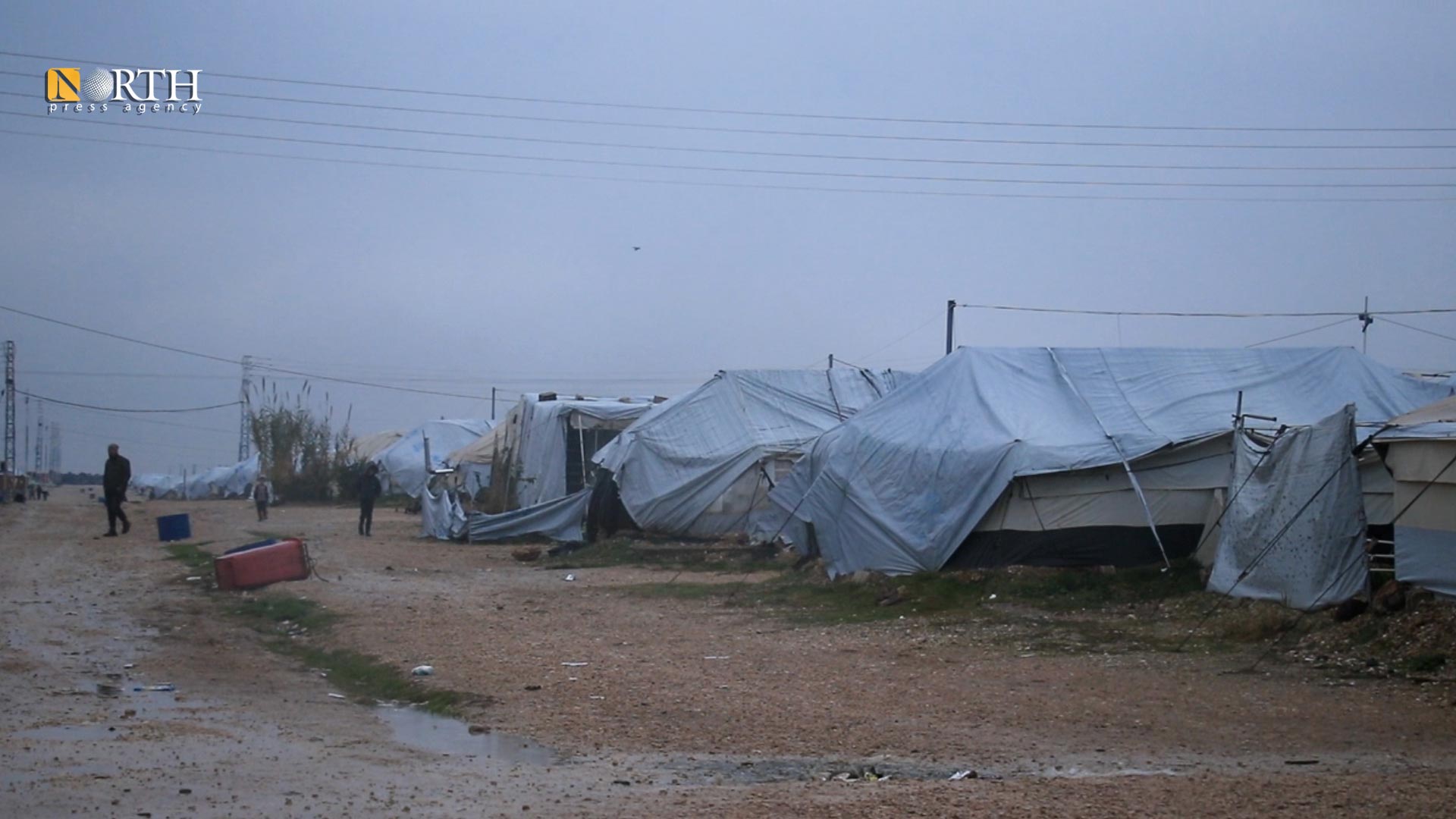QAMISHLI, Syria (North Press) – Shamsa is to walk for a distance many times a day to fill a gallon of water from the water tank in Newroz camp for the IDPs in the city of Derik (al-Malikiyah) in the far northeast Syria.
Shamsa Ali, 70, is an IDP from the village of Tel Tawil in Sere Kaniye (Ras al-Ain), describes their condition as a “Terrible one”.
The elderly woman, who has diabetes and brucellosis, suffer, like other residents of the camp, from hard living conditions and no water closets.
IDPs living in Newroz camp endure lack of support from NGOs operating in the area in light of the continued closure of al-Ya’rubiya (Tel Kocher) border crossing between Syria and Iraq. They receive aid but sporadically.
From her part, Nadia al-Ahmad, 35, describes the situation in the camp as a “very bad one.”
Al-Ahmad is an IDP from Sere Kaniye and has been living in the camp for nearly nine months. Her children get cold from time to another.
The woman attributes the reason to “the environment we live in, germs and dirt surround us.”
She added, “The sector we live in is very bad. There is no WCs or kitchens either.”
Al-Ahmad fears over her children to get diseases at a time no medicines or treatment are available in the camp.
The woman holds the operating NGOs accountable for the lack of medicines to prevent the spread of diseases that could claim the lives in such dire situations in the camp.
On January 7, Loqman Ahmi, spokesman of the Autonomous Administration of North and East Syria (AANES), called on active powers in the Syrian issue and permanent members of the United Nations Security Council (UNSC) to pressurize to re-activate Tel Kocher border crossing.
“The closure of the crossing has affected the access of humanitarian supplies to northeastern Syria,” Ahmi told North Press.
The UN mandate to deliver cross-border humanitarian aid to Syria is set to expire on January 10.
In July 2014, the UNSC adopted Resolution 2165 which authorized the UN to deliver cross-border humanitarian aid to Syria through four crossings al-Ramtha crossing with Jordan, Bab al-Salameh and Bab al-Hawa with Turkey, and Tel Kocher with Iraq, without the consent of the Syrian government.
In January 2020, UN Res. 2504 was adopted which reduced the number of border crossings to only Bab al-Salameh and Bab al-Hawa for a period of six months open to renewal in a special meeting by the UNSC.
Since July 2020, Bab al-Hawa has been the only crossing kept open to UN aid based on Resolution 2533 (2020), while the use of the others was curtailed.
In July 2022, the UNSC approved extending lifesaving aid deliveries into northwest Syria through the Bab al-Hawa crossing for six months.
Ali Aleiwi, 44, is an IDP from the village of Derbe of Sere Kaniye has been living in Newroz camp for nearly 8 months. He said, “Aid and services are hardly provided in the camp. We call on NGOs to render aid and help for children and to secure basic items and necessities.”
Aleiwi added that the situation in the camp was very dire, “There are elderly people who cannot work to earn a living. They receive no aid either. How could they maintain their affairs?
Newroz camp, which was reopened during the Turkish invasion on Sere Kaniye and Tel Abyad in 2019, includes 1.095 families, comprising 5.872 people.
In October 2019, the Turkish forces and their affiliated armed opposition factions, known as the Syrian National Army (SNA), launched a military operation against Tel Abyad and Sere Kaniye cities.
The operation was named “Peace Spring” and led to the occupation of the two cities and their countryside in addition to the displacement of more than 300.000 of the original inhabitants.
Nadim Omar, an official in the Relations Department of the camp told North Press, the UNICEF promised them nearly seven months ago it would install public services, “However, up to date nothing has been produced.”
Up to now, the NGOs have not yet delivered any aid even winter clothes attributing the reason behind such a delay to “The closure of the border crossings that impede the delivery of humanitarian aid and medical items,” according to Omar.
Omar appealed to the operating NGOs to press the European countries to re-open the Tel Kocher border crossing because it is the “sole artery for delivering aid to the IDPs.”
He indicated that in case the crossing remains closed, that would eventually lead to a “Humanitarian catastrophe”.

